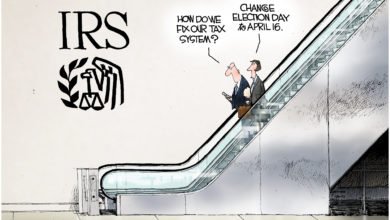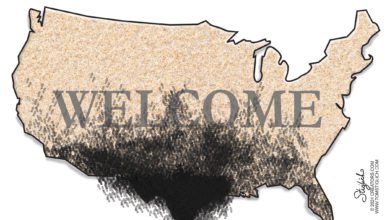This Thanksgiving Brought to You By — Capitalism
Mmm, capitalism tastes great. Love the wonderful aromatics glazing the crispy turkey skin on this fist-sized drumstick, dipping that bad boy in spicy turkey gravy, and then a glob of silky smooth mashed potatoes, and then maybe a dollop of stuffing, and then a hint of cranberry sauce, and then — gulp, scene.
Oh, I’m sorry, was that uncompassionate of me? Children are going hungry somewhere in the world where there is no food and we shouldn’t be so greedy? Well, once upon a time in America, everyone was going hungry, and it wasn’t because of corporate fat cats stealing their turkeys.
That’s not the narrative you’re likely to get at one of the socialist think tanks masquerading as colleges nowadays. PETA (People for the Eating of Tasty Animals) is comparing the plight of turkeys to those of gays and blacks (if you’d like to call them from “reality,” you’re going to have to leave a voicemail). Left-wing bloggers are showing solidarity with Native American students protesting the holiday, due to the ugly history surrounding the European immigrants settling the pristine wilderness and fighting off savages.
Of course, no land should ever be settled on our ever-so-gentle Mother Earth, which displayed its loving side by wiping out half of the Eastern seaboard a few weeks back. Not to mention that most “imperialist” powers like a few handfuls of religious dissidents in rickety sailboats wouldn’t be so kind as to offer free government everything and tax-free casinos to the conquered.
Let’s not pretend that certain Native American tribes didn’t declare war on each other (despite intense efforts to “white-wash” history); some of them even scalping their victims and trading their skullcaps for wacky weed. The idealized version where the Indians were just a bunch of brown-skinned, peace-loving hippies who sat around stringing wampum, skinning buffaloes, and smoking peace pipes is a nasty fiction, invented solely to make Americans feel guilty for being prosperous.
It wasn’t always that way. Oh no. Once upon a time, Americans were — shhhh — progressives.
Back in the day, “the day” meaning 1623, people fled to the New World to get away from the kind of nanny-statism our awesome left-wingers champion today. But our patriotic kindred who washed up upon former Taxachusetts’ shore were, one way to put it, a bit on the naive, utopian side. Another way to put it — they were socialist jackasses.
But we’ll forgive our Puritan brethren, because they were able to pull off a feat of such unparalleled brilliance that no modern left-winger has yet been able to achieve it. It’s called “learning from your mistakes.”
So there was this guy named William Bradford, Billy to his friends, and he was a bit of an overeducated nerd. See, he’d been reading this guy named “Plato,” and this ancient Greek dude said that all people should have things in common. Never mind that the smarter ancient Greek dude named Aristotle, who was nonetheless the pupil of Plato, said that was a bunch of bunk, and people should own their own property, but should generally be generous to others. He wasn’t real hardcore about property rights; but still, the guy was already about 2,500 years ahead of today’s Prius-driving radical professors.
Well, Bradford decided everyone would sing kumbaya and throw in lot together and that would make life good for the folks at Plymouth Plantation. One small problem: the system didn’t work. And it wasn’t because of greedy banksters’ ATM fees or even currency devaluation or anything wonky like that. It’s just that people had a tendency to “free ride” off of others in a situation known as the “tragedy of the commons.”
The stupid white man starved the entire winter and it really was a miserable experience. The Native Americans nearby, “Indians” in Old World speak (America’s forefathers didn’t have GPS), did help them a bit, and that was cool. But the main reason the people didn’t starve during the second winter was by implementing a primitive form of capitalism: private property and personal responsibility. The first “get off my lawn” signs went up. If you’re a hipster who has never read this story before, then study up, butter-cup.
“Right-wing” bloggers didn’t invent this story, it comes right out of Billy Bradford’s dream journal. Fleeing religious persecution in Europe, the members of various Christian sects set off to the New World to found their utopian societies. One of them was Plymouth Plantation, and its head honcho was Bradford. After successive winters of near starvation (aided in the first by the Native Americans), the HCIC (Head Calvinist-in-Charge) relates the experiences of the settlement (1623). Much apologies for not being able to translate this long passage into modern eight-grade level English:
“The experience that was had in this common course and condition, tried sundry years and that amongst godly and sober men, may well evince the vanity of that conceit of Plato’s and other ancients applauded by some of later times; and that the taking away of property and bringing in community into a commonwealth would make them happy and flourishing; as if they were wiser than God. For this community (so far as it was) was found to breed much confusion and discontent and retard much employment that would have been to their benefit and comfort. For the young men, that were most able and fit for labor and service, did repine that they should spend their time and strength to work for other men’s wives and children without any recompense. The strong, or man of parts, had no more in division of victuals and clothes than he that was weak and not able to do a quarter the other could; this was thought injustice. The aged and graver men to be ranked and equalized in labors and victuals, clothes etc., with the meaner and younger sort, thought it some indignity and disrespect unto them. And for men’s wives to be commanded to do service for other men, as dressing their meat, washing their clothes, etc., they deemed it a kind of slavery, neither could many husbands well brook it. Upon the point all being to have alike, and all to do alike, they thought themselves in the like condition, and one as good as another; and so, if it did not cut off those relations that God hath set amongst men, yet it did at least much diminish and take off the mutual respects that should be preserved amongst them. And would have been worse if they had been men of another condition. Let none object this is men’s corruption, and nothing to the course itself. I answer, seeing all men have this corruption in them, God in His wisdom saw another course fitter for them.”
The experience of Plymouth Plantation is that of other utopian societies in world history, that freedom from oppression by the state does not lead to absolute freedom. The revolution of private property did not merely provide the means for individuals to meet their own needs, but rather to flourish spectacularly. Those who thirsted for individual freedom risked their lives and fortunes to found a new nation on the pillars of liberty and property. These ideals gave birth to dreams of a world where all can strive for personal excellence, uninhibited by a tyranny of morally inferior men.
Enjoy your Thanksgiving! Even you lefty whiners.






Okay, well, Happy Thanksgiving!